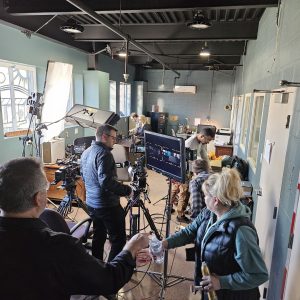An Amazon documentary will feature the local manufacturer of a potentially revolutionary product
By: Gabriel Scotto
Posted on:
ATHENS, Ohio (WOUB) – A local manufacturer with a product that could potentially revolutionize intermodal shipping has received a grant from Amazon Business.
QuickLoadz, which manufactures automated container trailers that do not require a crane to load and unload, was the only Ohio business and the only heavy manufacturer to receive a grant from Amazon Business, which is a division of online retailer Amazon. Amazon is also producing a documentary about QuickLoadz and the other grant winners.
Some of the largest corporations in America have expressed interest in QuickLoadz’s self-loading trailers, including Walmart and Lowe’s. Industry experts say the trailers are part of a broader trend toward automation in shipping and logistics and could enable rural communities to participate in the intermodal shipping industry.

“When I graduated, I discovered everybody who I knew in engineering was sitting in a cubicle somewhere and I didn’t want to do that,” Jones said. “So (I) got into student rentals and then started building houses.”
While working in construction, Jones realized his company’s fleet of trucks and trailers spent much of their time sitting idle while not in use and started using shipping containers instead.
Other contractors took note and Jones’ company began renting out shipping containers to local businesses for storage. It was while renting out containers that Jones realized how difficult it was to load and unload a container onto a truck chassis.
“If you’re at a port, it’s easy because you’ve got this giant, million-dollar crane to pick it up and put it on there. But unless you’re at a port, you need to then rent a crane or some other way to pick up this container and take it off,” Jones explained.
After selling his storage company, Jones began experimenting with designs for a trailer that could load and unload shipping containers without the use of a crane. Jones initially designed his product with mobile storage in mind, but soon pivoted to intermodal freight after a market study by TechGROWTH Ohio.
“(TechGROWTH Ohio) said it was the single strongest response they’d ever seen and said that they estimated our market to be $3 billion,” Jones said. “People are constantly using these containers, they’re trying to move loaded ones and you just can’t, you’ve got to have a crane.”
According to Gerhardt Muller, professor of global intermodal freight transportation and logistics at Lamar University in Texas, intermodal shipping is becoming increasingly automated. Operations at container terminals in Europe and Asia are already automated and North American terminals such as Norfolk and Los Angeles are following suit.
Stephen Keppler, an intermodal consultant with Scopelitis Transportation Consulting, said automated container trailers could be beneficial for smaller communities such as Athens that may not be able to afford purchasing specialized cranes for loading and unloading containers.
“You need equipment that can move (containers) quickly and in a lot of the underserved communities around the country, it doesn’t make sense to invest in some of these expensive types of cranes because they don’t have the volume to make it worthwhile,” Keppler said.
QuickLoadz’s automated contained trailers have an onboard computer that loads and unloads containers and can be controlled from a driver’s cell phone using Wi-Fi. The bed of the trailer pivots and a lift wedge is inserted between the container and the ground before a system of rollers lifts the container onto the bed. The whole process takes around three minutes.
Since opening its doors in 2013, QuickLoadz has sold over 100 automated container trailers. Most of its customers are in the United States and Canada, but QuickLoadz has made sales to customers as far afield as Abu Dhabi.
Major corporations have expressed interest in what QuickLoadz has to offer. At a conference in Bentonville, Arkansas, Jones was approached by a representative from Walmart who was interested in purchasing 1,000 trailers. Jones had to decline the offer because his company lacks the production capacity to fulfill large orders, though it is working to change that.
“Right now, we make between two and three a month and our next step is to get to one a week and then try to get to 10 a week,” Jones said.
The Amazon grant will help with that, Jones said. Out of 35,000 applicants, QuickLoadz was one of 15 finalists selected by Amazon Business and “Entrepreneur” magazine to receive a grant.
“(We) selected QuickLoadz … based on a range of criteria, including their innovation, ability to give back to their community and plan for business expansion,” according to a statement by Amazon Business.
Jones says QuickLoadz plans on using the $15,000 grant to raise awareness of its product and secure financing from investors through crowdfunding so the company can expand production.
“One of the reasons why (Amazon) said that they gave us the grant is because what we’re trying to do is so difficult,” Jones explained. “Every piece of equipment is a quarter of a million dollars, you have to have a huge facility and then you have to try to get adoption. It’s a big thing and so they were impressed that we were trying.”

